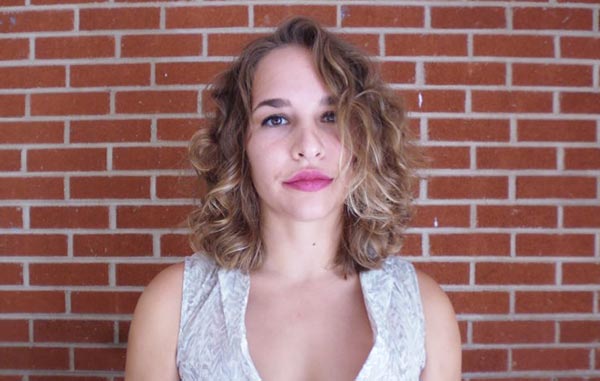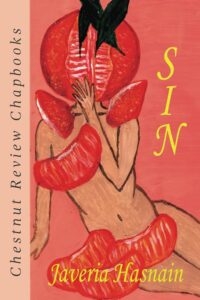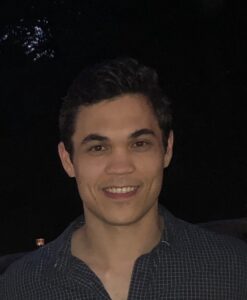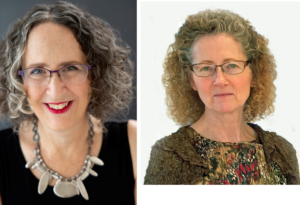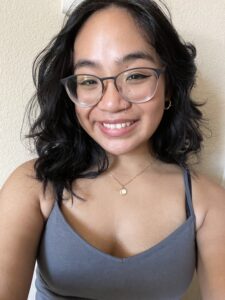Dorothea Lasky, I Wouldn’t Be a Poet Without You: How Black Life Influenced My Poetics
by Katie Condon
January 23, 2017
Dorothea Lasky’s second poetry collection, Black Life, was assigned as a part of a creative writing course I took in college, and because I had gotten away with it for 19 years so far, I didn’t bother glancing at the book before class. Plus, I had recently heard the T.S. Eliot quote that says something like: all poets have their best ideas before age 18 and spend the rest of their lives writing after them. Since I took that quote seriously, I figured if I could remember everything I thought of a year ago and write it down, POETRY would be happy to publish me in no time. Like every other late teen, I thought I had nothing left to learn.
You can see where this is going—when a classmate read the following lines from a late poem in Black Life called “It’s a lonely world” I was knocked down by a surprise I imagine is similar to being told you’re expecting twins at fifty-five:
Hi everybody
It’s Dorothea, Dorothea Lasky
I have done something very wrong and
I am so very sorry about it
“You have done a very bad,
Very bad job” my old boss says
In his Honda
As I take his dick in my mouth—
“Poems can have dicks in them?!” I thought.
“Not only, young Katie, can you put dicks in poems, but you can do so without having to make symbols of them. Fuck allusion,” is what, I imagine now, Black Life laughed back to me.

I hadn’t even read her book yet, and already Lasky was teaching me valuable lessons in being honest and direct. What I appreciated most about the collection when I decided to neglect all other assigned reading to pour over Black Life ad infinitum was its complete lack of self-concsiousness—how Lasky not only titled a poem “Mike, I had an affair,” but followed it with the lines “You know I am a great woman / I am a great woman” without the slightest implication of irony or apology. Although I was not new to the writing game, I hadn’t been hanging around the ring long enough to have rid myself of the paralyzing fear of revealing anything about myself in my writing because WHAT IF SOMEONE ACTUALLY READ IT. Fortunately for me, the bravado and sincerity Lasky hemmed Black Life with were contagious, and soon I was testing the boundaries of my own timidity: What happens if I write about drugs and sex? What chaos will ensue if I address the dude I’m so angry with, like Lasky did with Mike? To my disbelief, nothing happened. I didn’t get kicked out of school. I wasn’t struck by a reckless tractor-trailer sent by God. The only difference I noticed after trying out Lasky’s aesthetic tools was that a few roots had stretched themselves out from the little writing-seed I’d planted years ago, and anchored themselves into the ground of fierce, femme, confessional poetry.
Although I’ve picked up Black Life for reassurance and support frequently over the past seven years, I noticed after reading it closely this fall how much more I’d learned from the book than I’d realized. In addition to speaking honestly about my own life (and putting dicks in poems), my poetics also learned from Lasky how important it is to balance authority and bravado with vulnerability and inclusiveness. For every poem of Lasky’s that asserts “If I am standing in front of you / right now, you are listening to the voice of one of the greatest poets of your time” there is also a poem that positions itself as “I just feel so bad” does, which follows in full:
I just feel so bad
I don’t know
How to overcome it
Skinner says that it is my
Way that makes me function
In this world
I like to think
About things that are nice
And pretty
I like to plant purple flowers in my mind
That dazzle the starscape
There is no one for me to talk to
Except you dear reader
When there is no one else
To love, there is only you
To pour my love into
The snow
Echoes out the landscape
I have no home
No bread
I am destitute
But inside me
Is a little voice
That must speak
It gets louder when you listen
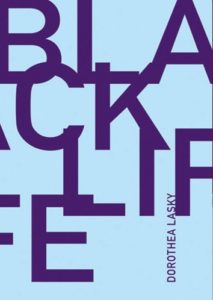
In this poem, and in others throughout Black Life, the speaker risks sentimentality and casts herself in an unflattering light with eagerness and ease. When Lasky confides in her readers that she, the poet who parades with a god-like authority in the surrounding pages, feels “destitute,” she engages in a generosity that is often mistaken for humility—she tells us that we have agency in her poems, even the ones that strut. In this way, Lasky taught me that alienating your readers, like my teenaged poetry unintentionally did in fear of being too revealing, is not a sign of poetic genius, or even minor talent. Poetry, rather, is an intimate exchange, like a kiss, between the poet and reader. Faux humility might convince someone to lean into you for a poem or two, in the same way exaggerated confidence can. It is only generous and sincere vulnerability, however, that allows a reader to trust your voice for the length of a book, or career.
I don’t owe all of my poetic principles to Lasky’s second book, but I owe it a hell of a lot: the first time I read Black Life, Lasky gave me permission to never ask for permission again; every time I’ve read it since, she’s reminded me of the exchange, of the delicate equilibrium a poet must strike to empower the reader at the same time she causes them to tremble.
—–
ABOUT THE AUTHOR
Katie Condon is a Poetry Editor at Grist. If you would like to see first hand how her poetry has been influenced by Dorothea Lasky, head to http://www.katiecondonpoetry.com. To get your own copy of Black Life, visit wwww.wavepoetry.com


